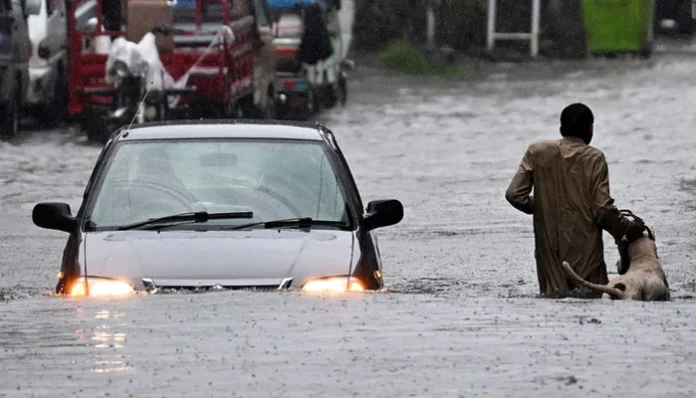Torrential rains battered Karachi and other areas of southern Sindh on Tuesday, resulting in the tragic deaths of at least eight people, while crippling the city’s infrastructure. The devastating situation has prompted immediate coordination between federal and provincial authorities to tackle the crisis.
The downpour began early on Tuesday and continued through the evening, with only brief pauses, overwhelming Karachi’s already strained infrastructure. Key roads became submerged, traffic ground to a halt, and power outages affected several districts across the city. Flooded underpasses, overflowing drainage lines, and downed electricity poles created chaos for commuters, while multiple neighborhoods were left in the dark as the city’s electricity grid failed to cope with the excess load.
Authorities confirmed that the severe weather led to eight fatalities, including electrocution and structural collapses. According to the Pakistan Meteorological Department, some areas received an alarming amount of rainfall, with Saadi Town recording the highest at 176 millimeters, followed by Gulshan-i-Hadeed at 173mm and the Airport Old Area at 159mm. Other neighborhoods, including Nazimabad, Surjani Town, DHA Phase VII, and University Road, reported rainfall of over 130mm.
The National Disaster Management Authority (NDMA) issued a warning, indicating that the rain spell would likely continue until Saturday, with another round of heavy showers expected by the end of the month. NDMA Chairman Lieutenant General Inam Haider Malik confirmed that the authority is in close contact with Sindh’s local officials and is preparing awareness campaigns to alert residents in vulnerable areas.
In response to the unprecedented rainfall, Sindh Chief Minister Syed Murad Ali Shah declared a public holiday on Wednesday for all government, semi-government, autonomous, and private institutions, although essential services remained operational. Schools across the province will stay closed to ensure safety during the continuing downpours.
Prime Minister Muhammad Shehbaz Sharif reached out to the Sindh Chief Minister, offering support for relief efforts and directing NDMA to maintain continuous coordination with provincial officials. The Prime Minister assured that the federal government would provide all necessary assistance during this critical time.
This disaster exposed Karachi’s vulnerability to climate shocks and highlighted the city’s inadequate drainage infrastructure. As floodwaters receded, questions were raised about the urgent need for sustainable urban planning and investments in climate resilience. The situation calls for rethinking infrastructure development to protect Pakistan’s commercial hub from future climate-induced disasters.




